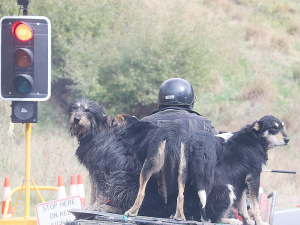NZ Catchment Groups Thrive with ‘Source to Sea’ Approach
The most successful catchment groups in NZ are those that have 'a source to sea' approach.
 The WellMates programme is having a positive effect in increasing awareness and building knowledge of rural mental health.
The WellMates programme is having a positive effect in increasing awareness and building knowledge of rural mental health.
Mental health and resilience programme WellMates is available at Massey University for a second year after research found that it has significantly benefitted participants.
Developed by Lincoln University after the suicides of former alumni, WellMates promotes mental health and wellbeing to first year ag students. Studies show farmers are prone to experiencing burnout and especially young adults in the rural community, with this group making up a quarter of farm suicides.
Massey’s School of Social Work senior lecturer Dr Nicky Stanley- Clarke says WellMates is having a positive effect in increasing awareness and building knowledge of mental health.
Conducting surveys on 19 participating and 58 non-participating students, those who participated in the programme showed greater mental health and wellbeing knowledge for those who participated than those who didn’t.
“WellMates helped them build their skills and improve their confidence in advocating for themselves and others,” Stanley-Clarke adds.
An interesting trend that appeared in the pre-programme survey was the number of students who presented with optimism bias. This is underestimation of the possibility of experiencing stressful situations and severity of these. Research found that peerto- peer connection is very important in combating this thinking.
A second round of funding from Massey Lincoln Agriculture Industry Fund (MLAIF) has also provided the opportunity for WellMates to be offered online this year – with learning designers at Massey translating the content from in-person courses and recording videos and voiceovers. This will be incorporated into a module embedded within learning platforms such as Stream, with additional available resources for wellbeing and counselling services like TalkCampus.
The Massey pilot is being led by Lincoln students trained in the programme, who flew up to Palmerston North to deliver and facilitate the programme.
This was run as a ‘conversation’ rather than a lecture, to further the point of it being about mental wellness, rather than a purely academic exercise.
“Students will get to hear from people like them about how important it is to manage your wellbeing and to know how to access support which helps break down stigma, particularly around the ‘tough farmer’ ideal,” explains Stanley- Clarke. “When you see others like you having that conversation, you’re more likely to join in and be engaged.”
Stanley-Clarke hopes younger people moving into rural communities can take back what they’ve learnt and pass it along. She also hopes to expand the programme into other spaces adjacent to – and outside of – agriculture.
“Any lives lost to suicide is too many. Whatever we can do to build and strengthen knowledge around mental health wellbeing, as well as share how to reach out to access support and support others, has to be good.”
WellMates will be hosted in Massey’s agriculture environment course as part of its Animal Science paper.
Global trade has been thrown into another bout of uncertainty following the overnight ruling by US Supreme Court, striking down President Donald Trump's decision to impose additional tariffs on trading partners.
Controls on the movement of fruit and vegetables in the Auckland suburb of Mt Roskill have been lifted.
Fonterra farmer shareholders and unit holders are in line for another payment in April.
Farmers are being encouraged to take a closer look at the refrigerants running inside their on-farm systems, as international and domestic pressure continues to build on high global warming potential (GWP) 400-series refrigerants.
As expected, Fonterra has lifted its 2025-26 forecast farmgate milk price mid-point to $9.50/kgMS.
Bovonic says a return on investment study has found its automated mastitis detection technology, QuadSense, is delivering financial, labour, and animal-health benefits on New Zealand dairy farms worth an estimated $29,547 per season.

OPINION: Here w go: the election date is set for November 7 and the politicians are out of the gate…
OPINION: ECan data was released a few days ago showing Canterbury farmers have made “giant strides on environmental performance”.